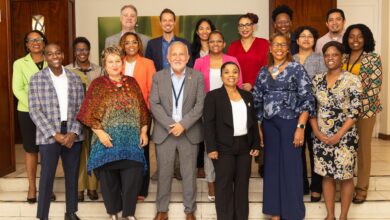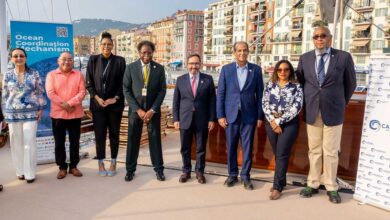The Caribbean Community (CARICOM) Secretariat’s expansion of its involvement in biodiversity in the Region is timely as it coincides with work being undertaken to establish a post-2015 sustainable development agenda in which biodiversity conservation and restoration are featured prominently.
This is the view articulated by Project Coordinator in the Sustainable Development Unit at the CARICOM Secretariat Dr. Therese Yarde at the opening ceremony of a workshop on sustainable financing and resource mobilisation for biodiversity.
The workshop is being held by the CARICOM Secretariat at the City View Hotel in Antigua and Barbuda 18-21 May 2015. The CARICOM Secretariat is partnering with the Secretariat of the Convention on Biological Diversity, the Government of Antigua and Barbuda, and the United Nations Environment Programme Regional Office for Latin America and the Caribbean to deliver the workshop.
Dr. Yarde informed participants that the CARICOM Secretariat’s engagement in this partnership was part of a wider project for capacity-building related to multilateral environmental agreements (MEAs) in African, Caribbean and Pacific countries. She outlined that the workshop aimed to equip participants with tools, information, and skills to better frame biodiversity issues in economic terms, and to formulate proposals for sourcing money for biodiversity conservation and management.
It brings together colleagues from the fields of environment and economics, and I am confident that this will produce the kind of cross-sectoral dialogue and sharing of ideas that is so important to environmental mainstreaming,” Dr. Yarde said.
She also said that it was essential for the Region to move away from tackling environmental and socio-economic issues in separate silos, and to begin working towards integrating the economic value of biodiversity into national accounts and development strategies.
Permanent Secretary in the Ministry of Health and Environment in Antigua and Barbuda Ms. Hildred Simpson, who also spoke at the event, said every opportunity to have appropriate systems in place to facilitate rapid mobilisation of resources must be used. She also pointed out that accessing financial resources was generally seen as difficult and frustrating.
Resource mobilisation will be more readily achieved when there is a firm appreciation of the situation being addressed as well as the extent of the capabilities of the resources themselves,” she said.
Keynote speaker, Mr. Troy Torrington, Minister Counsellor, Permanent Mission of Guyana to the UN, said while there was still work to be done, the Region was well on its way. Speaking on behalf of Ambassador Talbot, Co-chair of the Third International Conference on Financing for Development and Permanent Representative of Guyana to the UN, Mr. Torrington said a lot could be learnt from the approaches and mechanisms employed in biodiversity and that there were many lessons that could be imparted to the international community and other sectors. He said he had taken into account the importance of biodiversity for the Caribbean Region, including its tourism product and was convinced that biodiversity would be a key catalyst for achieving the sustainable development agenda.
We must now work to ensure that the contribution that biodiversity can make is adequately recognised and strengthened, including at the Regional and national levels,” he said.
The CARICOM Secretariat’s engagement in this partnership is part of a wider project for capacity-building related to multilateral environmental agreements (MEAs) in African, Caribbean and Pacific countries. The project is funded by the European Union, and coordinated by the United Nations Environment Programme.






